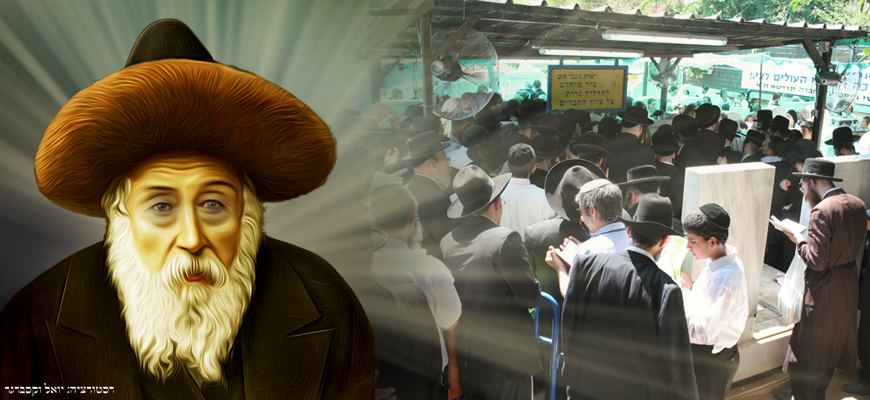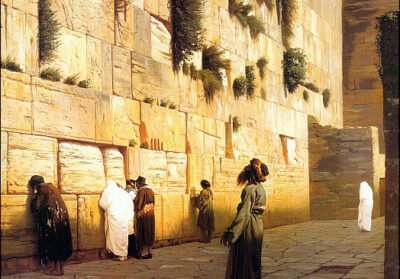Menachem Mendel of Vitebsk Zt”l who did not leave behind him a lasting seed
Today 1st Iar, the day of Hilula of Rabbi Menachem Mendel of Vitebsk, Ben Rabbi Moshe ‘The Pri Ha’aretz’ (died in 1788)
Rabbi Menachem Mendel of Vitebsk Zt”l was born to his father Reb Moshe in the year 1730 approximately. During his childhood he had the privilege of seeing the light of the seven days, the holy Ba’al Shem Tov, and was one of the distinguished Talmidim of the great Maggid Zt”l. After the Maggid’s death, he took over the leadership of the sect of Chasidim in the Raisin region. In the year 1777, he immigrated to Eretz Yisrael together with about three hundred people who accompanied him. In the 1st of Iar 1788 he returned his soul to its creator and was buried in the cemetery in Tiberias. The words of his Torah and his many letters were printed in his holy bbook “Pri Ha’aretz”.
The Talmid of the holy Ba’al Shem Tov:
The Rebbe was honored to be by The holy Ba’al Shem Tov at a very young age, and had a great closeness to him. It is said that The holy Ba’al Shem Tov waited with the Mincha of Erev Shabbat until the Rebbe arrived for the prayer, after that he told him a long story, in which he hinted at all the events of his life. Later, the Rebbe revealed to his intimates that between him he understood from this story, that his future is in the Eretz Israel. And so it really was.
King of Israel:
His leadership was most wonderful, in terms of kingship and rule, but even with the mannerisms of the kingship in leading openly, he was very humble. This is what the “Toledot Yaakov Yosef” testified about him, it was when our rabbi visited him in Polnea – before his ascension to Eretz Yisrael – and despite the fact that he came to him in a chariot according to the way of the governors and walked extensively “he was accepted by the rabbi of Polnea with great respect, and his Talmidim were very surprised at this…”
When the Talmidim of the “Toledot” asked their rabbi, “What is it that he honored him so much, his answer was that there was a king that had to be away sometimes from his home, and he had important treasures, and he locked each one in a proper and excellent guard, but there was one thing that he was very afraid of, that people will see a very guarded thing, they will look for advice on how to break the locks and steal the beloved of his heart, so he made suggestions to dig a pit in the ground, and bury his beloved in the ground, and cover it with trash, who thinks to look in the trash?. So is this Rabbe, he is very humble, but he is afraid that surely the Yetzer Hara will try to harm him, so he covers himself with trash such as Gahava.”
The Tzadikim of his generation respected him immeasurably, and once when he visited Rabbi Pinchas of Koritz, he made many preparations to welcome him saying: After all, the king of Israel is coming here, so we must prepare to welcome him with honor, as befits the king of Israel.
As the Rebbe of Rozin told is youngest son Rabbi Mordechai Feibish of Hosiatin – when he reached the age of Bar Mitzvah – “that Chasidim from Rozin who huddled under the shadow of their Rabbi the Great Maggid, came and apologized to him, that the he is very far from their place, and it is difficult to come to him at any time, and it was also difficult for them to be without a Rabbi, and the Maggid took out one of his garments for them, as well as a belt and a cane, and said to them: Take these things, and hand them over to a man named Mendel in Vitebsk, and then hide in his shadow, whenever it is difficult for you to come to me.
The talmidim traveled to Vitebsk and began to demand and serch for Reb Mendel, and the people of the place said there is no such person here, until they hit a woman, and she asked them: what are you looking for? We are looking for Rabbi Mendel, they answered, There is a lot of people here named Mendel, but not Rabbi Mendel, my son-in-law is also named Mendel, she sayd, so they realized that this is the man they are asking for, and they went to her son-in-law, and gave him these things from the Maggid, and he took the clothing and dressed himself, and girded the belt, and took the stick in his hand, and immediately they didn’t recognize him that this is the same man they saw earlier, and his fear fell on them.” (כנסת ישראל עב, א- ב)
Knows human thoughts:
When the “Ba’al HaTanya” – was once asked by his friend and colleague the rabbi the “Maor Einim” of Chernobyl “what was the strength of Rabbi Mendel, the “Tanya” answered him: Rabbi Mendel knew the thoughts of every person. He continued to ask: And so what, so he answered: He also knew the thoughts of a man among all his life.”
The holy letter for peace:
When the persecutions of those who opposed the Chasidut began, he went to Vilna together with the Baal HaTanya, in order to calm the dispute, but it didn’t work. And in his holy words from a letter he sent while he was in Eretz Israel: “והנה היא דרכי מראש מקדמי ארץ ישראל הייתי חושק ומתאווה ליחד ולאחדות, אבל מה אעשה כי בינותינו המליץ היו מפיחי כזבים ודוברי שקרים נגד עיניהם להעליל עלילות ברשע אותנו לפניהם”.
In a special letter to the sages of Vilna, he expressed his sorrow for the division and persecution: “וה’ אלקים אמת הוא יסיר את המליץ אשר בינותינו המה המלשינים, מסכים המבדילים נרגנים המפרידים בין הדבקים ומשלחים מדנים בין האחים, המה היו בעוכרי ישראל, ואלו הן הגורמים בנזיקין, פיהם נעשה כל ריב וכל נגע, ועל ידם נשפך דם נפשות אביונים נקיים והכשילו את הצדיקים ההולכים לתומם, לדון דיני נפשות עד מקום שידם מגעת ותעש, והנה א-ל אלקים ה’ הוא יודע, וישראל הוא יודע כי שקר ענו בנו”.
His holy mind did not cool down until he swore: “הנני עומד כהיום על אדמת קודש, והיה ה’ לי לאלקים עד, בו אני נשבע, ובשמו אני נושא באם שיש בנו ובדעתי זו ובאמונתינו ח”ו שום שמץ דופי או ח”ו כפירות תוה”ק שבכתב ושבעל פה, אפילו איזה סייג וגדר מצוה נגד ה’ ונגד משיחו אל יושיענו היום הזה …”
As we know, he was prevented from entering the house of the Gra, so he couldn’t to argue with him, and for the rest of his life he regretted that he did not break the door and entered it, because if he had met with him it would have come to a good end.
The great Aliya in 1777:
The historic aliya to the Land of Israel of our rabbi and his colleagues Rabbi Avraham HaCohen of Kalisk and Rabbi Yisrael of Plutsk, Talmidim of the Great Maggid Rabbi Ber of Mezritz Zt”l, at the head of a large congregation which, included over three hundred people.
For five months, the caravan which left Raisin in Russia after Passover in the year 1777, traveled. through Vahlin, Ukraine and Podolia. When they arrived in Mohelev at the Dinster river, Rabbi Shneur Zalman of Ladi Zt”l – the Baal HaTanya, who accompanied them until there, separated from them. From the port of Galatz they sailed to Kushta, and from there they made their way to the Land of Israel.
On the way, a larger public as joined them, and the leaders of the Aliya, agreed to take care of all their needs, as will be presented below.
On 5th of Elul 1777 they arrived at the port of Acre, and from there they continued to the Jewish Community of Safed, which they chose as their settlement. According to the researchers, the choice of Safed for their settlement was, “because of course they could not settle in Jerusalem, where there was no place for a large and visible Ashkenazi settlement, because of old duties from the aliya days of Rabbi Yehuda Chasid. Even Hebron was not a place within the boundaries of the small ‘courtyard’ for a large settlement.” So only the Galilee was an option, and between the two cities of Safed and Tiberias they first preferred Safed, following the concessions of the new governor testified to the settlers there, by the influence of his Jewish minister advisor R. Chaim Farhi of Damascus.
This caused a great impression – not only in the Land of Israel – but mainly in the country of origin Raisin and Lithuania, after it was known there that they came to Israel.
Before us opens a tiny dawn, which illuminates for us the secret of our Rebbe’s aliya, and from it a stake and a point for the renewal of the Jewish settlement in the Holy Land.
In many of his letters, he describes the sufferings of the Land of Israel that the first ones went through when they settled there, emphasizing that there is no possibility of being saved from them, since the Sages compared the Land of Israel to the Torah and to the next world that comes through suffering (ברכות ה, א), but he adds, “But in our opinion we suffered so much agony, that it’s enough for everyone that whants to come to Eretz Israel.
(אגרת א, לקוטי אמרים שם)








